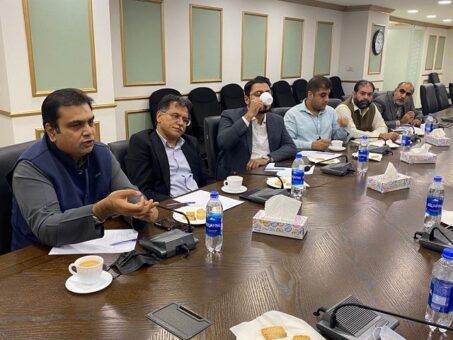In a recently held Annual General Meeting, the Karachi Tax Bar Association (KTBA) announced the results of its elections, with Syed Rehan Hasan Jafri being re-elected as the President for the year 2022.
(more…)Tag: Karachi Tax Bar Association
-

KTBA identifies anomaly in SRB’s appellate system
Karachi Tax Bar Association (KTBA) has identified a sheer violation of the constitution by the Sindh Revenue Board (SRB) regarding appointments in appellate system.
KTBA President Muhammad Zeeshan Merchant in a letter to SRB Chairman Wasif Ali Memon pointed out the irregularities in appointments of provincial tax officials in first appellate forum available to taxpayers i.e. Appeals.
READ MORE: KTBA highlights anomalies in single sales tax return
Merchant referred to the Constitution of Islamic Republic of Pakistan which is coined on the trichotomy of power.
The Article 175 of the Constitution envisages separation of powers between legislature, executive and judiciary ostensibly to prevent the concentration of power and to check transgression.
The Supreme Court of Pakistan in the case of Government of Baluchistan Vs. Azizullah Memon reported as PLD 1993 SC 31 has seconded the above analogy.
READ MORE: KTBA passes resolution against FTO Asif Jah
With the given methodology, it needs to be appreciated that the Notification No. SRB 3-4/34/2021 dated December 20, 2021 issued by the Member (Operations) Sindh Revenue Board (“SRB”), infringes upon the structure of trichotomy and separation of power in so far as following situations are concerned:
Zamir A. Khalid, presently posted as the Commissioner (Legal) is also given the additional charge of the Commissioner (Appeals – I)
Muhammad Iqbal Lakho, presently posted as Commissioner-III is also given the additional charge of the Commissioner (Appeals – II).
READ MORE: KTBA highlights issues in implementing digital payments
The KTBA expressed the surprise to see such a belligerent offensive on the constitutional methodology by a distinguished institution like SRB.
“We believe this prima facie is a travesty of justice as no one can be judge of his own cause. Please subscribe that this is further likely to shake the confidence of litigants (taxpayers) on the SRB as an independent appellate forum with the dedicated Commissioner (Appeals) is the only solution.”
READ MORE: KTBA submits recommendations for e-filing of appeals
-

KTBA passes resolution against FTO Asif Jah
KARACHI: The Karachi Tax Bar Association (KTBA) on Tuesday passed a resolution against the statement of Federal Tax Ombudsman (FTO) Dr. Asif Mahmood Jah.
Following is the text of the resolution:
Karachi Tax Bar Association (KTBA) expresses its deep disapproval and condemnation for recent jibes by the Federal Tax Ombudsman Pakistan (FTO), Dr. Asif Mahmood Jah. The statement made by the FTO lately televised on electronic media / uploaded on social media is offensive towards the taxpayers and manifests his nepotism and biased approach in the discharge of his official duties. The arbitrary and belligerent statement by the FTO is not only contrary to his oath prescribed in Schedule via Section 3(2) of Federal Tax Ombudsman Ordinance, 2000 read with Section 8 of Federal Ombudsmen Institutional Reforms Act, 2013 but also makes him guilty of misconduct that renders him incapable of holding public office anymore.
The entire tax fraternity is in a fix over the rude and offensive remarks of Dr. Asif Mahmood Jah and demands his immediate resignation from the office of FTO. Nonetheless, by way of this resolution, we ask the Hon’ble President of Pakistan to remove him from his office in the exercise of his powers vested U/s. 6(2) of FTO Ordinance, 2000 else a reference against him may be sent to Supreme Judicial Council under the recourse of Section 5 of FTO Institutional Reforms Act, 2013 immediately.
We believe the statement has eroded the already depleting confidence of the taxpayers and the tax consultants in the office of Federal Tax Ombudsman which had bluntly been submissive towards the Department and have shied away for not (i) allowing a stay of recovery/injunctions to the complainants: Section 10 and 11; (ii) avoiding defiance proceeding against tax collectors: Section 12; and (iii) punish tax collectors for contempt: Section 16 and 12 ibid for obvious reasons.
On a final note, the KTBA urges the Federal Law Ministry that rules may be prescribed to desist induction of the retired FBR officials in the official of Federal Tax Ombudsman for the sake of transparency and propriety.
-

KTBA submits recommendations for e-filing of appeals
KARACHI: Karachi Tax Bar Association (KTBA) has submitted suggestions to the Federal Board of Revenue (FBR) for the implementation of electronic filing of appeals in sales tax and federal excise.
The tax bar sent a set of recommendations to the FBR on Tuesday for e-filing of appeals in sales tax and federal excise regimes.
The KTBA said that a distinct numerical number should be allotted to each appeal and similarly acknowledgment for each appeal should be served to the appellant from the concerned Commissioner Appeals.
A digital or web based form has been proposed to be prescribed that essentially contains basic information about the case, including appellant’s name and its number, tax periods, order jurisdiction/section, order date and tax demanded etc. This feature though omitted from income tax regime with introduction of e-filing of appeals, has been suggested to be reintroduced in like manner.
The KTBA said that currently late e-filing of appeals under the income tax regime is conditional to acceptance of application for condonation of time by the concerned commissioner appeals. The tax bar suggested that no such condition should be adopted in the sales tax e-appeals and the same should also be done away with from e-appeals under the income tax regime.
The rules for fixation and disposal of stay application should have definite deadlines for the concerned commissioner appeals to follow mandatorily with consequences. “Needless to add that the timelines prescribed under Rule 76G of the Income Tax Rules 2002 are not practiced in letter and spirit.”
The tax bar said that all notices and orders in appeals proceedings shall effectively be served via primary modes as provided under Section 56(1)(a), 56(1)(b) of the Sales Tax Act, 1990 and in case this being not possible only then option of service of notices and orders via secondary modes as provided under Section 56(1)(c) and (d) of the Act shall be exploited. “The date of service of notice or order shall essentially be reckoned in like manner.”
The KTBA said that all notices and orders including stay orders issued by the concerned commissioner appeals should seamlessly be served to the concerned field formations so that the IRIS portal is updated bilaterally in real-time.
The tax bar further proposed that the portal should have dedicated link to upload: written arguments; and miscellaneous applications for multiple reasons etc.
The FBR has been suggested that the draft e-appeal procedure should be shared with the KTBA prior to launching in order to undertake enhanced due diligence.
Further, before adoption of the new system, the manual filing of appeal as in vogue currently should be run concurrently for some time.
-

KTBA highlights issues in implementing digital payments
KARACHI: Tax practitioners have said that implementing digital payments mode for corporate entities is not possible due to various difficulties.
Karachi Tax Bar Association (KTBA) in a letter sent on Monday to the Muhammad Ashfaq Ahmed, Chairman, Federal Board of Revenue (FBR), informed that a provision of digital payment was introduced through Tax Laws (Third Amendment) Ordinance, 2021. This provisions is scheduled to implement from November 01, 2021.
Muhammad Zeeshan Merchant, President, KTBA said that the condition is remarkably in contradiction with other modes of payment through banking channels, which is historically remained in practice and is widely accepted under the provisions of the Income Tax Ordinance, 2001.
“We feel that this provision of law is antibusiness; sans due diligence and is incorporated without taking the stakeholders into confidence,” he said.
Additionally, it is not practical for many business houses, he added.
A summary explaining certain situations (and by no means a complete synopsis) is given below:
(a) You will appreciate that it is normal business practice that in lieu of advance delivery of goods, the buyer tenders its payment by way of post-dated cheques, which is normally accepted by the other party and is inherently a secured way of making the payment. We are afraid that this law of “digital mode of payment” is surely going to hamper the business activities, as it does not cater the situation and solution of such transactions.
(b) Normally, it is a practice that, the port terminal charges, wharfage charges, charges for clearance of delivery orders etc., are paid in advance through crossed cheques or pay-orders. We understand that presently, the businesses, including but not limited to Port Terminal Operators and Shipping Lines, are unaware and are not ready for implantation of this “digital mode of payment”. In our view, it needs a rigorous awareness campaign for them.
(c) Furthermore, we feel that the similar issues are likely to arise and are to be faced by the Companies for making payments to the growers of various agricultural crops such as sugar cane, rice, cotton, wheat etc. We feel that a rigorous campaign is also required for the recipients of such payments.
(d) Moreover, in our view this “digital mode of payment” is also impractical and is likely to affect the business transactions in the cases where petty cash payments, in aggregate exceed millions of rupees, which cannot be made digitally.
(e) Furthermore, we understand that various banks have fixed their own limitation on the quantity of making digital/online payments in a day and have also fixed the threshold of the amount and they do not allow to exceed the threshold limit fixed by them. In our view, this also needs a proper campaign without which the implementation of the law is not possible.
The KTBA said that the tax authorities would come across with the other impediments on the subject in times to come.
We strongly believe that, unless there is a wide off the mark in conventional banking transaction, this move is likely to create lots of trouble for the Corporate Sector.
It is, therefore, suggested that the mandatory condition of “digital mode of payment” for Companies as envisaged U/s. 21 (la) of the Income Tax Ordinance, 2001, be allowed to run simultaneously with other conventional modes of payments for at least a year so that their business is not affected and is smoothly run till they are aware of this change in the mode of payment.
-

FBR suspends credit notes against unregistered supplies
The Federal Board of Revenue (FBR) has stirred controversy with its recent decision to suspend credit notes against supplies made to unregistered persons, a move that has drawn strong protests from the Karachi Tax Bar Association (KTBA).
(more…) -

Date extension to become useless on flawed return form
Karachi Tax Bar Association (KTBA) on Wednesday pointed out that serious technical issues in online return form are not resolved and the date extension granted by the Federal Board of Revenue (FBR) will become useless.
The FBR through Circular No. 08 extended the last date for filing income tax return for tax year 2021 up to October 15, 2021 from September 30, 2021. The FBR extended the date after admitting serious technical problems on the IRIS – the online return filing portal.
The KTBA wrote a letter to FBR Chairman Dr. Muhammad Ashfaq Ahmed apprising him about computational errors and technical issues in filing of income tax return for the tax year 2021.
In his letter KTBA President Muhammad Zeeshan Merchant said that technical issues were not rectified yet and taxpayers were facing difficulties in filing their returns.
“The 90 days time prescribed under section 118 of the Income Tax Ordinance, 2001, will only begin once the due diligence prescribed in law and rules is following in pitch and substance and a complete and flawless return of income is notified in terms of Section 237 of the Income Tax Ordinance, 2001,” Merchant said.
The tax bar said the issues were previously highlighted related to erroneous tax computation on the IRIS portal with respect to income expressed as ‘minimum tax’, where owing to pre-fixed attributes/formulas taxpayer are forced to pay additional tax or file mix-up return.
This issue despite being pitted to judicial wrangling before the Lahore High Court in writ jurisdiction dated September 24, 2021, has not been resolved as yet, Merchant added
Furthermore, the return of income at the IRIS still suffers technical issues and anomalies that were already highlighted through the KTBA letter dated September 21, 2021. The issues are included: loss on disposal of securities; incorrect working of tax on foreign incomes; discrepancies in tax computation of commercial importers; tax on fee for technical services/royalty of a non-resident person etc.
The KTBA pointed out that simplified return of income for SMEs was unceremoniously uploaded on IRIS portal without prescribing a draft return.
-

KTBA suggests measures for successful POS integration
KARACHI: Karachi Tax Bar Association (KTBA) on Friday suggested measures for successful integration of Point of Sales (POS). One of the suggestions included that the Federal Board of Revenue (FBR) should launch a mass scale awareness program for integration in order to avoid resistance from the business community.
KTBA President Muhammad Zeeshan Merchant said that the ongoing enforcement for the installation of POS would result in resistance as retailers were not aware whether they were liable to integrate or not under the law.
The KTBA President highlighted the problems of lack of information regarding POS installation at a meeting with a team of officers from the Large Taxpayers Office (LTO) Karachi.
Zeeshan Merchant reiterated that the KTBA fully supports the FBRs stance on POS, being a noble cause for the documentation of the economy and further explained the problems faced by the businessmen in the implementation of POS.
Merchant said that the STGOs of Tier-1 Retailers issued by the FBR in the case of small traders is unjustified wherein even small shop holders are also included and the FBR has only fixed the criteria of turnover to implementing the POS.
FBR needs to launch a large-scale campaign for educating Tier-1 Retailers and the general masses regarding the usefulness of bringing Tier-1 Retailers on POS. In this regard, the president of KTBA has given the following suggestions:
— A unified comittee to the extent of all field offices within Karachi must be constituted to discuss POS issues and solutions at one forum. Discussion on weekly basis must be encouraged and business representatives may also be invited in this forum.
— Joint seminars having officers from FBR, members of KTBA and representatives of various business organizations must be arranged to address the issues and fears of the business committee being faced in the implementation of POS. This would vanish the resistance and pave a long way for POS. ADCR must be kept active to resolve issues like POS. This would be a harbinger of success, provided there is a positive approach all around.
— FBR should take penal actions only to the extent of clear cases falling in the definition of Tier-1 Retailers.
— Retailers are the affected ones for the reason that manufacturers hesitate giving invoices for their purchases, whereas wholesalers and distributors are found nowhere in this chain of POS. If there is no input tax available to them then how would they pay the output tax.
— To implement POS, media campaign in the form of electronic media, social media, affixing of flyers at common places must be ensured to create awareness among the masses.
— Reasonable time of four months must be given for implementation of POS to the business committee.
— One of the fears of the POS liable retailers is that their sale will reach climax due to the implementation of POS and the department would take action against them for the previous five years as well. FBR has to take a policy decisions in this regard to address their genuine fear as to implement POS, the government has to look forward and not backward to move on in the right direction.
— Service sector needs to be addressed as SRB is also pursuing integration on POS. The retailers, restaurants are therefore in confusion about whom to report in this regard.
— SRO 779(1)/2020 dated 26.08.2020 needs a Tier-1 Retailer to be a registered person with Sales Tax meaning thereby a taxpayer has to get itself registered in Sales Tax first to implement SRO 779(1)/2020.
— POS-related expenses are one of the concerns of the small traders.
— Companies providing POS machines licensed by the Board are creating issues for the retailers. Government / FBR run POS machines must be provided to avoid such issues.
— It was also suggested that those who are integrated POS should automatically be excluded from the purview of section 8B of the Sales Tax Act, 1990 as prescribed vide SRO 344(I)/2020 dated 29.04.2020.
— Taxpayers using debit / credit card machines in the past were encouraged to use to bring the economy under documentation and now the same channel is being used to bring them under Tier-1 Retailers by bringing them in the definition of Tier-1 Retailer. This creates agony among the already documented sector and businessmen are now trying to stop using this important tool of documentation anymore.
— Department must show grace in granting extension in the filing of Sales Tax Return of those taxpayers who have been integrated with POS and are now facing problem in their filing of ST return.
— In order to achieve success in the POS implementation exercise, sector-wise profiling is recommended including plastic, paper and steel sectors by virtue of which big distributors and wholesalers would come under control thereby reducing the burden on other tiers of the economy.
— In the last, the success of POS exercise depends upon efficient control on manufacturers and importers.
The meeting was conducted at LTO, Karachi and attended by: Nisar Ahmed Burki, Additional Commissioner Inland Revenue; Mukhtiar Ahmed Shar, Additional Commissioner Inland Revenue; Anees Ahmed Memon, Deputy Commissioner Inland Revenue; Khush Ahmed Din, Senior Auditor.
Besides KTBA President Muhammad Zeeshan Merchant, the other members were also at the meeting, who are included: SyedFaiq Raza, General Secretary; Mehmood Bikiya, Vice President; HarisTufail, Joint Secretary; Shiraz Khan, Librarian; and Irfan Ghafoor, Member Admin.
-

FBR’s return filing portal response inconsistent: KTBA
As the clock ticks down on the last day for filing income tax returns in Pakistan, taxpayers are encountering significant challenges with the country’s online return filing portal, IRIS.
(more…) -

PM requested for return filing date extension
KARACHI: Karachi Tax Bar Association (KTBA) on Tuesday apprised Prime Minister Imran Khan about difficulties in the return filing and requested for date extension up to December 31, 2021.
(more…)
